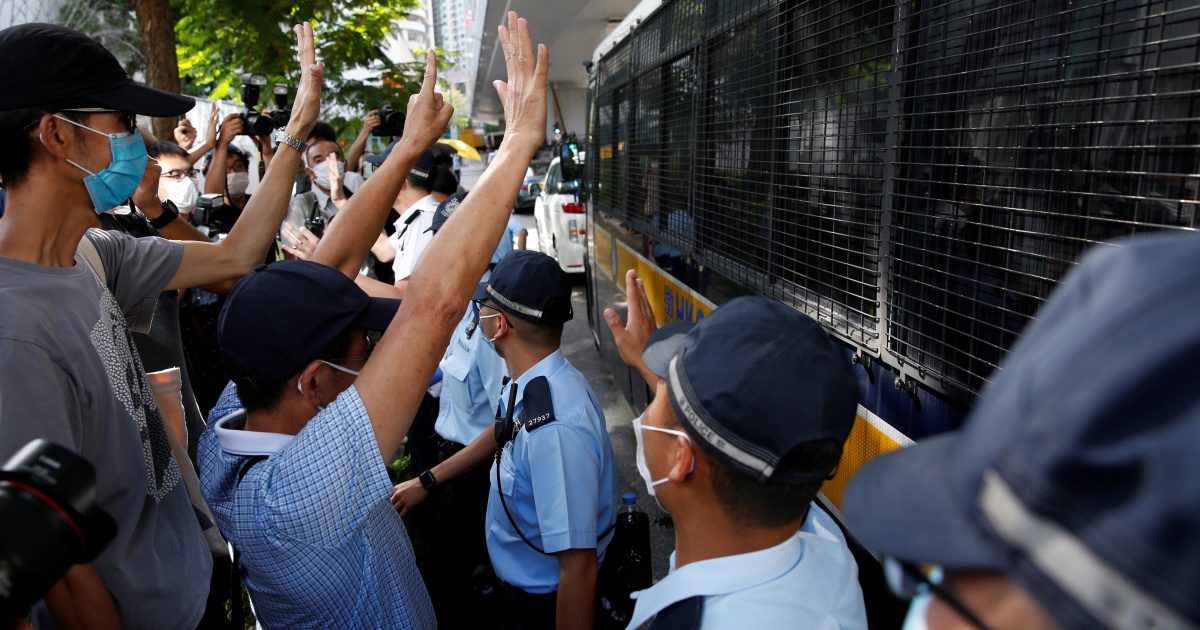HK man sentenced to 9 years in first national security law case
Former waiter Tong Ying-kit, 24, was convicted of terrorism and secession earlier this week in Hong Kong.
The first person convicted under Hong Kong’s national security law was sentenced on Friday to nine years in prison, judges said, in a watershed ruling with long-term implications for the city’s judicial landscape.
Former waiter Tong Ying-kit was sentenced to six and a half years in jail for the incitement to secession charge, and another eight years for allegedly committing acts of terror.
Considering the totality principle of the court, Tong is to serve two and half years of his “terrorism” sentence consecutively with the six and a half years incitement to secession charge, bringing his total time in prison to nine year. Other parts of the sentence will be served concurrently.
He was also barred from obtaining a driver’s license for 10 years.
The court did not consider as mitigating circumstances Tong’s good behaviour and his personal situation as the breadwinner of his family.
At the sentencing on Friday, Tong told his family, “I will watch the sunset, you guys keep striving”, according to Galileo Cheng, of the Hong Kong Catholic Institution Staff Association.
In a statement, Amnesty International said the sentencing “confirms fears that the national security law is not merely a tool to instill terror into government critics in HongKong; it is a weapon that will be used to incarcerate them.”
Outside the court, scores of people showed their support as they stood at an enclosed footbridge near the gate, where the police van carrying Tong was to emerge.
Tong’s lawyer, Clive Grossman, was quoted as saying that his client “will appeal” the sentence.
Senior Counsel Clive Grossman (R) leaves the High Court in Hong Kong on Friday after the sentencing of his client, Tong Ying-kit [Isaac Lawrence/AFP]
Tong, 24, was found guilty on Tuesday of terrorism for driving a motorbike into three police officers, and secession for flying a protest flag during a rally on July 1 last year, the day after Beijing imposed the sweeping national security law following months of anti-government protests.
The flag bore the banned slogan, “Liberate Hong Kong, revolution of our times”.
Tong had pleaded not guilty to all charges.
The trial focused mostly on the meaning of the slogan, which was ubiquitous during Hong Kong’s mass pro-democracy protests in 2019.
It was chanted on the streets, posted online, scrawled on walls and printed on everything from pamphlets, books, stickers and T-shirts to coffee mugs.
A parent and kid was afraid and moved to another side the witness the car. The mum told me she could not be happy today even Team #HongKong won how many gold or silver medal. She hopes her daughter to remember a lot of people tried to bid their farewell to Tong pic.twitter.com/o0n2CQBqyp — Galileo Cheng (@galileocheng) July 30, 2021
The debates drew on a range of topics, including ancient Chinese history, the US civil rights movement and Malcolm X, to ascertain whether the slogan was secessionist.
Two expert witnesses called by the defence to analyse the slogan’s meaning, drawing upon sources including an examination of some 25 million online posts, found “no substantial link” between the slogan and Hong Kong independence.
The governments in Beijing and Hong Kong have said repeatedly the national security law was necessary to bring stability after the often-violent 2019 protests and that the rights and freedoms promised to the city upon its return to Chinese rule in 1997 remain intact.
The law, imposed by Beijing in June 2020, punishes what China sees as subversion, secession, terrorism and collusion with foreign forces.
The government says all prosecutions have been handled independently and according to the law, and that legal enforcement action has nothing to do with the political stance, background or profession of those arrested.













